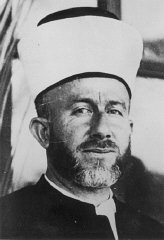You searched for: %EC%97%90%EB%B3%B4%ED%94%8C%EB%A0%88%EC%9D%B4%20evoplay%20dk22.top%20%EC%BD%94%EB%93%9C%206520%20%EC%B9%B4%EC%A7%80%EB%85%B8%EC%84%9C%EC%9A%B8%EC%A0%90%20%ED%95%9C%EA%B5%AD%EC%98%A8%EC%B9%B4%EC%82%AC%EC%9D%B4%ED%8A%B8%20%EB%B0%94%EC%B9%B4%EB%9D%BC%EC%82%AC%EC%9D%B4%ED%8A%B8%20%EC%B4%9D%ED%8C%90%20ioq
<< Previous | Displaying results 541-550 of 571 for "%EC%97%90%EB%B3%B4%ED%94%8C%EB%A0%88%EC%9D%B4%20evoplay%20dk22.top%20%EC%BD%94%EB%93%9C%206520%20%EC%B9%B4%EC%A7%80%EB%85%B8%EC%84%9C%EC%9A%B8%EC%A0%90%20%ED%95%9C%EA%B5%AD%EC%98%A8%EC%B9%B4%EC%82%AC%EC%9D%B4%ED%8A%B8%20%EB%B0%94%EC%B9%B4%EB%9D%BC%EC%82%AC%EC%9D%B4%ED%8A%B8%20%EC%B4%9D%ED%8C%90%20ioq" | Next >>
-
Ruth Webber describes the bitterness that she felt after the end of the war when she was in an orphanage in Krakow
Oral HistoryRuth was four years old when the Germans invaded Poland and occupied Ostrowiec. Her family was forced into a ghetto. Germans took over her father's photography business, although he was allowed to continue working outside the ghetto. Before the ghetto was liquidated, Ruth's parents sent her sister into hiding, and managed to get work at a labor camp outside the ghetto. Ruth also went into hiding, either in nearby woods or within the camp itself. When the camp was liquidated, Ruth's parents were split up.…
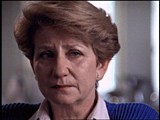
-
Ruth Webber describes the bitterness that she felt after the end of the war when she was in an orphanage in Krakow
Oral HistoryRuth was four years old when the Germans invaded Poland and occupied Ostrowiec. Her family was forced into a ghetto. Germans took over her father's photography business, although he was allowed to continue working outside the ghetto. Before the ghetto was liquidated, Ruth's parents sent her sister into hiding, and managed to get work at a labor camp outside the ghetto. Ruth also went into hiding, either in nearby woods or within the camp itself. When the camp was liquidated, Ruth's parents were split up.…

-
Rifka Muscovitz Glatz describes living on a kibbutz and dealing with language barriers
Oral HistoryRifka was raised in a religious family in Debrecen. In the early 1940s, her family moved to Cluj (Kolozsvar) in Northern Transylvania, annexed to Hungary from Romania in 1940. In 1944, she and her family were forced to leave their house in Cluj. They were rounded up by Hungarian troops helping the Nazis and taken to a brick factory where they stayed for a month. In June 1944, Rifka was transported to the Bergen-Belsen concentration camp. Eight months later she was transported to Switzerland. She sailed to…
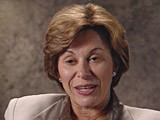
-
Frima L. describes roundup of Jews for mobile killing unit (Einsatzgruppen) massacre
Oral HistoryWhile Frima's family was confined to a ghetto, Nazis used her father as an interpreter. He later perished. By pretending not to be Jews, Frima, her mother, and sister escaped a German mobile killing unit massacre. They were later discovered and jailed. Again, her mother devised an escape. Frima's mother and sister were smuggled to Romania, while Frima wandered in search of safekeeping until her mother could arrange to smuggle her out. In Romania, they were reunited and liberated.
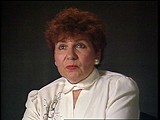
-
Ruth Webber describes witnessing a brutal punishment in the camp at Ostrowiec
Oral HistoryRuth was four years old when the Germans invaded Poland and occupied Ostrowiec. Her family was forced into a ghetto. Germans took over her father's photography business, although he was allowed to continue working outside the ghetto. Before the ghetto was liquidated, Ruth's parents sent her sister into hiding, and managed to get work at a labor camp outside the ghetto. Ruth also went into hiding, either in nearby woods or within the camp itself. When the camp was liquidated, Ruth's parents were split up.…
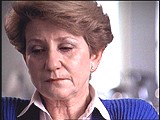
-
Ruth Meyerowitz describes sabotage effort in Malchow munitions factory
Oral HistoryIn Frankfurt, Ruth's family faced intensifying anti-Jewish measures; her father's business was taken over and Ruth's Jewish school was closed. In April 1943, Ruth and her family were deported to Auschwitz. Ruth was selected for forced labor and assigned to work on road repairs. She also worked in the "Kanada" unit, sorting possessions brought into the camp. In November 1944, Ruth was transferred to the Ravensbrueck camp system, in Germany. She was liberated in May 1945, during a death march from the…
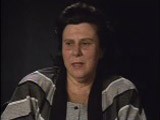
-
Combating Holocaust Denial: Origins of Holocaust Denial
ArticleLearn about some of the origins of Holocaust denial, including the euphemistic language the Nazis used to describe their policies and actions.
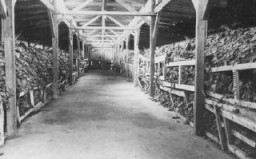
-
Nazi Book Burnings: Recurring Symbol
ArticleBook burnings and bans were not exclusive to—and did not end with—the Nazi regime. Learn more about the symbolism of book burnings.
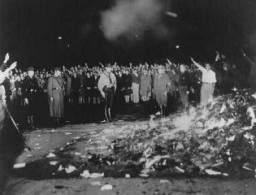
-
Wilek (William) Loew describes forced labor in Lvov
Oral HistoryWilek was the son of Jewish parents living in the southeastern Polish town of Lvov. His family owned and operated a winery that had been in family hands since 1870. Wilek's father died of a heart attack in 1929. Wilek entered secondary school in 1939. Soon after he began school, World War II began with the German invasion of Poland. Lvov was in the part of eastern Poland annexed by the Soviet Union. Although the Soviets took over Wilek's home and the family business, Wilek was able to continue his…
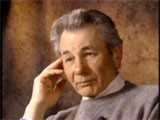
-
Hajj Amin al-Husayni: Arab Nationalist and Muslim Leader
ArticleHajj Amin al-Husayni claimed to speak for the Arab nation and the Muslim world and sought an alliance with the Axis powers during WWII. Learn more about his actions
